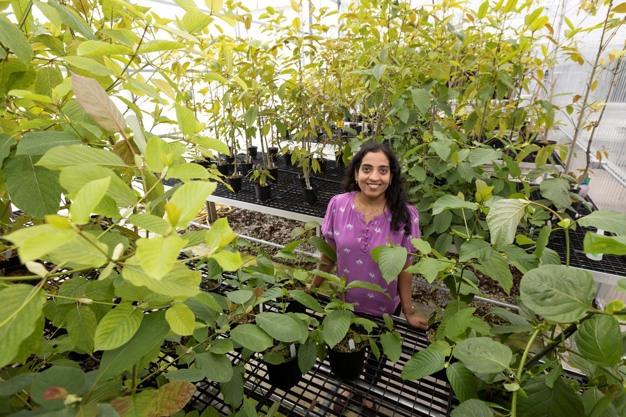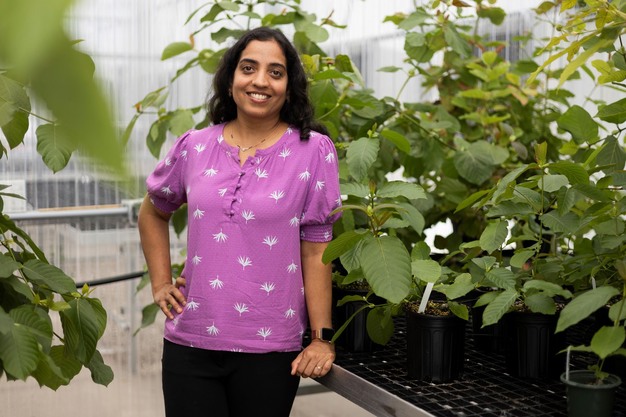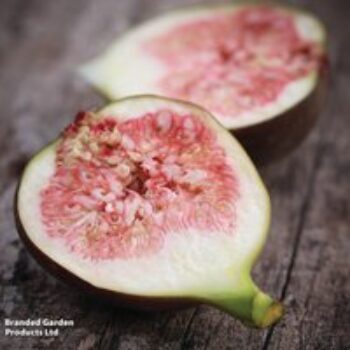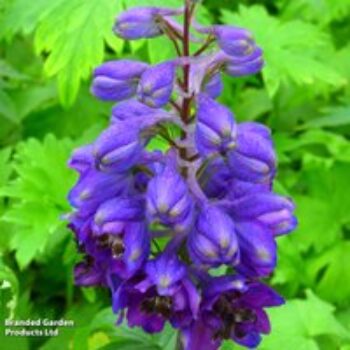The
USDA
National
Institute
of
Food
and
Agriculture
has
awarded
a
$650,000
grant
to
a
UF/IFAS
researcher
to
study
a
plant
that
could
help
mitigate
the
opioid
epidemic,
a
national
health
crisis
responsible
for
more
than
130
deaths
each
day.
Mitragyna
speciosa,
or
kratom,
is
a
tree
belonging
to
the
coffee
family.
The
tree’s
leaves
produce
unique
compounds
called
monoterpene
indole
alkaloids,
which
are
known
for
various
beneficial
pharmaceutical
uses.
Mitragynine,
for
example,
has
shown
promise
for
treating
pain,
opioid
use
disorder,
and
opioid
withdrawal,
and
it
does
so
without
demonstrating
addiction
potential.
Spirooxindole
mitraphylline,
another
kratom
alkaloid,
is
known
for
promoting
anti-tumor
activity.
But
how
kratom
produces
these
alkaloids
is
unknown.
Satya
Swathi
Nadakuduti,
an
assistant
professor
of
plant
biotechnology
and
biochemistry
in
the
UF/IFAS
environmental
horticulture
department,
will
lead
a
team
of
interdisciplinary
researchers
seeking
to
identify
the
genes
involved
and
to
decipher
the
multi-step
process
through
which
the
plant
produces
the
alkaloids.
The
team
will
do
so
by
studying
the
kratom
plant’s
genome,
gene
expression,
and
metabolites.
 Satya
Satya
Swathi
Nadakuduti
studying
her
plants
(Tyler
Jones,
UF/IFAS)
“Monoterpene
indole
alkaloids
serve
as
an
important
source
for
potential
drug
discovery,”
Nadakuduti
said.
“Understanding
their
biosynthesis
makes
it
possible
to
support
drug
development,
and
they
could
meet
emerging
and
future
markets
as
a
solution
to
the
opioid
crisis.”
Currently,
there
are
no
drug
products
containing
kratom
legally
sold
in
the
United
States,
and
the
Federal
Drug
Administration
warns
against
using
products
made
from
the
plant.
Some
“ostensible”
kratom
cultivars
marketed
in
the
country
have
altered
alkaloids,
and
the
biological
effects
of
their
consumption
depend
on
both
the
plant
and
the
leaf
development
stage
at
harvest,
Nadakuduti
said.
The
pharmaceutical
properties
of
these
plants
are
either
unknown
or
not
well
studied.
“Therefore,
reliance
on
kratom
products
of
unknown
alkaloid
content
and
questionable
quality,
in
addition
to
adulteration
with
other
psychoactive
substances,
has
become
a
concern
in
the
United
States,
confounding
adverse
effects
with
a
potential
for
abuse,”
she
said.

Nadakuduti’s
interdisciplinary
team
of
researchers
includes
Christopher
McCurdy,
a
medicinal
chemist
with
the
UF
College
of
Pharmacy;
Kelly
Balmant,
an
assistant
professor
of
bioinformatics
with
the
UF/IFAS
horticultural
sciences
department;
and
Thu-Thuy
Dang,
an
assistant
professor
of
biochemistry,
molecular
biology
and
chemistry
at
the
University
of
British
Columbia.
Source:
ifas.ufl.edu








